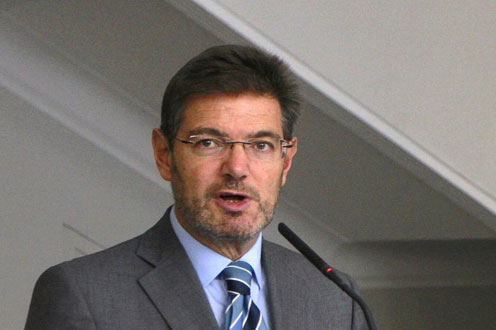Work meeting
Rafael Catalá advocates general data protection reform at his meeting with EU Justice Commissioner, Věra Jourová
News - 2015.6.22
Regarding the latter, the European commissioner praised the Spanish Law on Measures for Comprehensive Protection against Gender-based Violence, which she described as "highly exceptional" and stressed that she will use the "Spanish example" in negotiations with other EU countries that have not yet signed the Council of Europe Convention on preventing and combating violence against women and domestic violence.
European Data Protection Regulations
As regards the European Data Protection Regulations, which were approved on Monday at the JHA meeting in Luxembourg, Rafael Catalá expressed the Government of Spain's support with a view to undertaking a general reform of personal data protection as soon as possible. The Minister for Justice believes that the regulations are aimed at providing effective protection for personal privacy and fundamental rights against the threat of possible personal data farming and the indiscriminate use thereof.
Hence, the Minister for Justice believes that such a reform is the only way to increase the control that citizens have over their own data and reduce costs for business by freeing companies from unnecessary notification procedures. The Spanish position also defends the need to maintain a high degree of protection over the rights of individuals, especially on the Internet, by providing Member States with a certain level of flexibility in their adaptation of these regulations to certain sectors, such as the public sector. The European regulations advocate the need for personal data protection to not only be based on penalties but also on the prevention of misconduct.
In turn, the European Justice Commissioner, Věra Jourová, described the approval of these regulations as "critical" for continued progress towards a digital single market in the European Union and restoring confidence among EU citizens in the digital economy. Věra Jourová thanked the Government of Spain, and Minister Rafael Catalá in particular, for their support for this initiative and hopes that relations with Spain on this and other issues of the European justice agenda remain on the same level of flexible and constructive collaboration that they currently enjoy. Věra Jourová highlighted the "ambitious reform" undertaken by the Government of Spain to improve the Administration of Justice and hopes that the necessary efforts continue to be made, fundamentally in terms of modernising and digitalising processes, because "it is in the interests of everyone that the judicial system be independent and efficient".
Proposed creation of a European Public Prosecutor's Office
As regards the proposal to create a European Public Prosecutor's Office with powers to uncover those directly and indirectly responsible for misconduct against the financial interests of the European Union, a substantial boost was given to basic structural issues at the most recent meeting of the JHA Council. Particular focus was placed on matters relating to its structure and basic operating principles.
Spain's position maintains the need to promote this institution in order to overcome the reticence shown by certain European partners to create an effective Public Prosecutor's Office unbound from some of the limitations that borders continue to impose on the prosecution of such offences. The European commissioner expressed a similar opinion, saying she agrees with the creation of a European Public Prosecutor's Office and believes that defending the financial interests of EU citizens is a "priority".
EU Security Agenda
As regards matters of criminal justice on the EU Security Agenda, the Spanish Minister for Justice reiterated the growing concern among EU citizens over the problem of terrorism and the need - already expressed by the European Parliament at the end of last year - to adopt a forward-thinking strategy capable of adapting to changing situations to tackle the danger posed by overseas combatants, cyber-security, people trafficking, organised crime, money laundering and corruption.
On 28 April, the European Commission presented a Security Agenda focused on cooperation between Member States on these issues, doubling joint efforts in the fight against terrorism, organised crime and cybercrime. Rafael Catalá believes that the recent coordinated terrorist attacks of a cross-border nature underpin the idea that joint efforts are needed to resist these threats.
Successful use of the tools being promoted by the European Union to help national police authorities can only be achieved through effective cooperation between the institutions and agencies of Europe and the Member States. This approach should also be adapted to the new and emerging threats, and should be used to tackle the three most pressing challenges: the prevention of terrorism and combating radicalisation; the fight against organised crime; and the fight against cybercrime.
Finally, among other issues discussed during the course of the meeting, the two parties agreed on the need to make changes to the methodology used for the studies conducted regularly by the European Union, on the perception of how the justice system works in each Member State.





